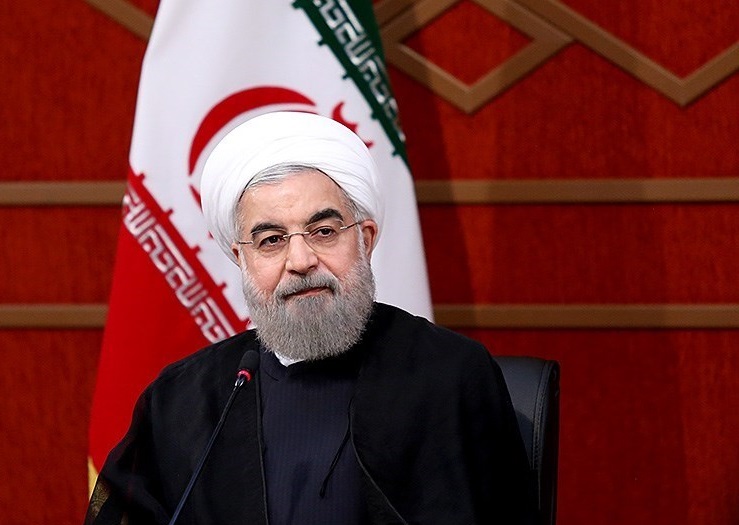by Peter Jenkins
Iran’s patience with Europe’s feeble submission to one of the most villainous U.S. administrations of all time finally ran out on May 8.
That day President Hassan Rouhani told the European parties to the Joint Comprehensive Plan of Action (JCPOA), via remarks at a session of his Cabinet, that henceforth Iranian performance of certain of the agreement’s commitments would be conditional on European performance of all its commitments. The European non-performances that he seemed to have in mind are the cessation of purchases of Iranian oil and the withdrawal of bank financing for trade with Iran. Both these non-performances are a consequence of a Trump administration threat to sanction any European entities purchasing Iranian oil or engaging in financial transactions with Iranian entities.
European governments are now in a very awkward situation.
They can threaten the United States with retaliation for any U.S. sanctions imposed on European entities in the Iranian context in the hope that the United States will relent and provide waivers for European oil purchases and the financing of trade with Iran (beyond the very narrow range of goods envisaged under the INSTEX initiative). Until now there has been no sign of the EU having the guts to do this. However, on May 3, speaking about Cuba, the EU’s foreign policy chief said that “the EU considers the extra-territorial application of unilateral restrictive measures to be contrary to international law and will draw on all appropriate measures.” Reuters reported this as a threat to retaliate and/or initiate dispute settlement proceedings at the World Trade Organisation (WTO).
After going through the steps provided by Article 36 of the JCPOA—to which President Rouhani referred in the course of his remarks—the Europeans can notify the UN Security Council that Iran is no longer performing all of its JCPOA commitments. This would make the Trump administration’s day, since the Security Council would then have to vote on whether to continue suspending pre-2016 UN sanctions, and it would only take a U.S. veto to bring that suspension to an end. An Iranian pull-out from the JCPOA would almost certainly ensue, and the nuclear non-proliferation cause (to which the Trump administration seems remarkably indifferent) would suffer.
A third option would be to tolerate Iranian non-performance of the commitments President Rouhani mentioned in the hope of retaining Iran as a party and preserving the enhanced access to Iranian nuclear activities that the International Atomic Energy Agency (IAEA) has enjoyed since 2015. This would hardly be a low-risk option. The odds are that Iran would respond by escalating its non-performance to a point at which the JCPOA ceased to have much, if any, nuclear non-proliferation value.
This unenviable situation is partly of the Europeans’ own making. They should not have ruled out, as they did within weeks of President Trump’s declaration of economic war on Iran a year ago, the option of retaliating if the United States failed to exclude Europe from the threat of extraterritorial sanctions. They should not have compounded that mistake by taking every opportunity—the French in particular—to echo U.S. rhetorical attacks on Iranian missile testing (a sovereign right, not outlawed by the UN) and so-called malign regional behavior (the allegation of malignity resting on a hypocritical judgement). The Europeans have soured their once healthy relations with Iran and are now suffering the consequences.
Of course, Iran’s decision to use non-performance to pressure Europe into confronting its “ally from hell” is not without risk. In due course, Iran may find itself in a position where face can only be saved by pulling out of the JCPOA. That will risk the Trump administration seizing on Iranian withdrawal as a pretext for destroying Iran’s military facilities, and perhaps much else (if other pretexts have not been found by then). It will cost Iran most, if not all, of the international prestige it won by signing the JCPOA. It may even lose Iran the backing of Russia and China, which care far more about the Nuclear Non-Proliferation Treaty (NPT) than does the Trump administration.
All in all, it’s a grim outlook unless the Europeans can find the courage to confront the Trump administration, so as to return to performance of their JCPOA commitments and preserve a valuable nuclear agreement.






The JCPOA was never about “nonproliferation” — there was never any evidence that Iran was proliferating and in fact Iran had long offered better terms that the JCPOA.
The JCPOA was about preventing the “Iranian nuclear threat” from being continued to be used as a pretext for a policy of imposing regime-change in Iran. It provided a face-saving way for the US to bow out of the track towards war that the Israelis were pushing for.
You would think that countries supposedly so threatened by a (non-existent) Iranian nuclear threat would favor a deal that imposed historically unprecedented restrictions on a perfectly legal civilian nuclear program, if they were actually concerned with proliferation of nukes
But that was never really the issue.
If “destroying Iran’s military facilities” was an option in the first place, we wouldn’t have come to this extremely complicated situation, 10 years on, where every move by every party betrays a level of caution clearly not indicative of an ability/willingness to send over bombers/striker groups and force Iran to sign a treaty it doesn’t want to.
What?!! Trump hasn’t put the UN on the US list of terrorist organizations?!!
Dream on, Ambassador Jenkins. The Europeans, like the rest of Washington’s vassal states, have grown comfortable in that role. No good deed goes unpunished in this imperial regime, so you won’t be seeing European leaders suddenly growing a backbone and doing the right thing. Besides, the Iranian regime knows, like most of the rest of us, that the tectonic plates are shifting, and it’s Iran, not the US, that has an attractive future waiting for it.